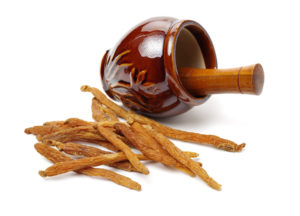Korean red ginseng has been used traditionally for the relief of some menopause symptoms, and also has some previously published data for this purpose. In the current double-blind, randomized placebo-controlled trial, Korean Red Ginseng was studied in women with surgical menopause due to a gynecological cancer. This is important as women with surgical menopause can have more severe and persistent menopause symptoms.
This 12-week study of Korean red ginseng used a root that was steamed and then sun dried and then powdered into 500 mg capsules with a dose of 2 capsules three times daily. Menopause symptoms were evaluated using a standard research tool called the Menopause Rating Scale (MRS). This scale of 11 symptoms includes depressed mood, irritability, anxiety, exhaustion, hot flashes/night sweats, cardiac complaints (ex/ rapid or irregular heartbeat), sleep issues, joint/muscle complaints, sexual dysfunction, urinary symptoms and vaginal dryness. Blood was also collected to assess lipids, hormones, biochemical markers and the neutrophil to lymphocyte ratio (NLR). After 59 women were selected for the study, 55 enrolled with 29 in the ginseng group and 26 in the placebo group. These were women who were premenopausal until their surgery that removed at least both ovaries and both fallopian tubes due to a gynecological cancer. The paper did not clarify what kind of cancer or stage.
Of the 11 menopause symptom categories, Korean red ginseng was associated with improvements in hot flushes, cardiac complaints, sleep disturbances and sexual dysfunction. The difference was only statistically significant in the sexual dysfunction category. MRS scores were also improved in the placebo group resulting in ginseng not showing an absolute reduction of menopausal symptoms.
In addition, Korean Red Ginseng did not show any abnormal changes in liver enzymes or kidney function, which is reassuring as to some of its safety profile.
Commentary: Previous studies using Korean Red Ginseng have shown positive effects in alleviating menopause symptoms using the Kupperman Index, the MRS and improvement of hot flashes. Another randomized controlled trial demonstrated positive effects in improving sexual function and sexual arousal in menopausal women. The current study is a small study resulting in a lack of statistical power due to small sample size. One oddity is that while lipids and hormone tests were taken at baseline, but they were not taken at the end of the 12 weeks.
While the current study shows some positive effects in some symptoms of menopause, it is essential to realize that most women with ovarian or fallopian tube cancer, or even early-stage uterine cancers, can take systemic estrogen. And in fact, because removing ovaries prior to menopause puts them at increased risk for osteoporosis, cardiovascular disease, Alzheimer’s disease and premature aging in general, giving them systemic estrogen is a preventive medicine risk reducing strategy. If I were using the Korean red ginseng in this population of women, I would not be using it instead of systemic estrogen but perhaps in addition to. Maybe it will help them with sexual dysfunction, and maybe it’s anti-inflammatory properties may help in preventing cancer progression, although there are other botanical contenders for that job as well.
Reference: Chung Y, et al. Effects of Korean red ginsend on menopausal sym,potms in premenopausal women after gynecologic cancer surgery. A double-blind, randomized controlled trial. J Altern Complement Med. 2021; 27(1): 66-72.


